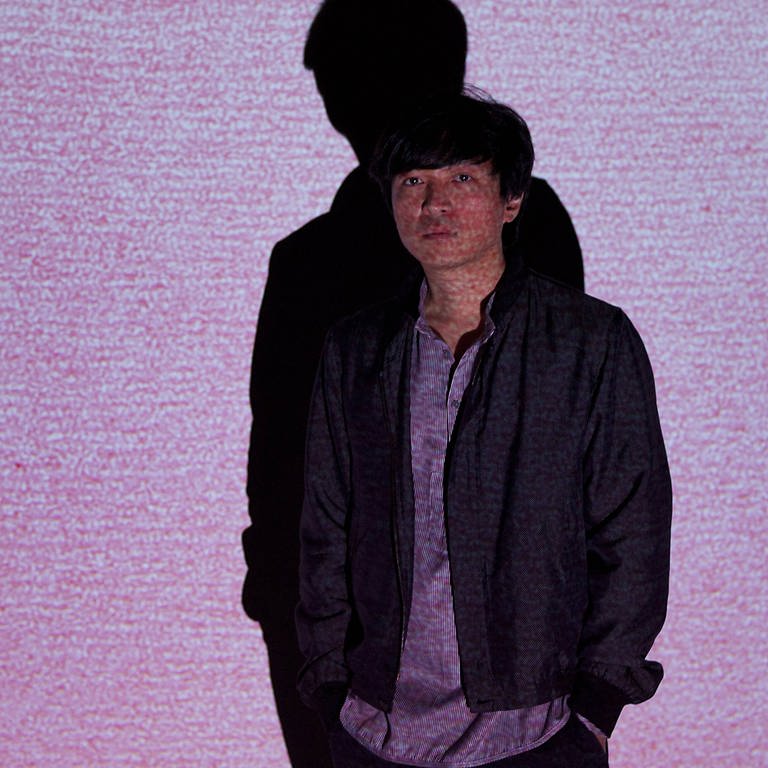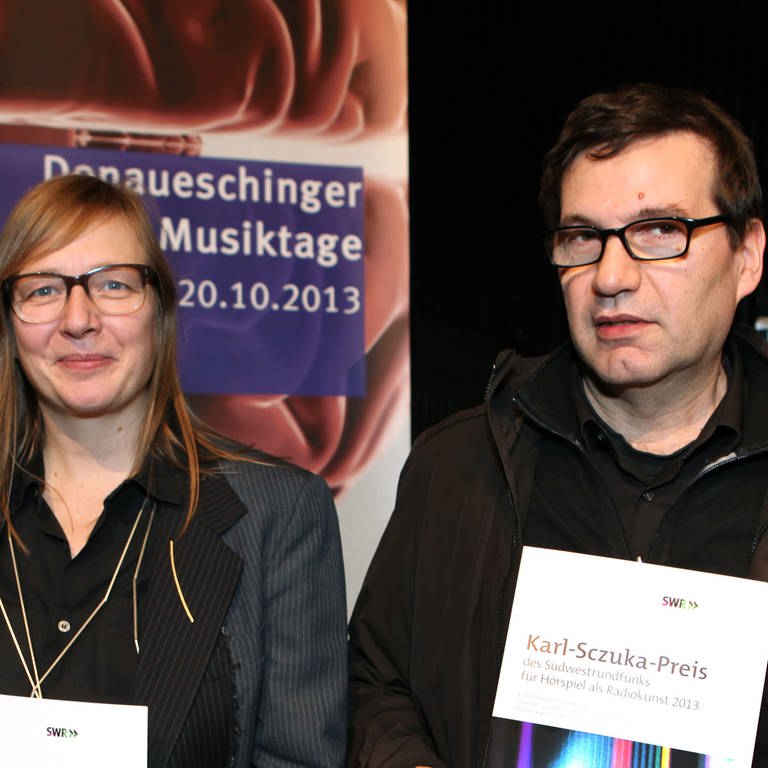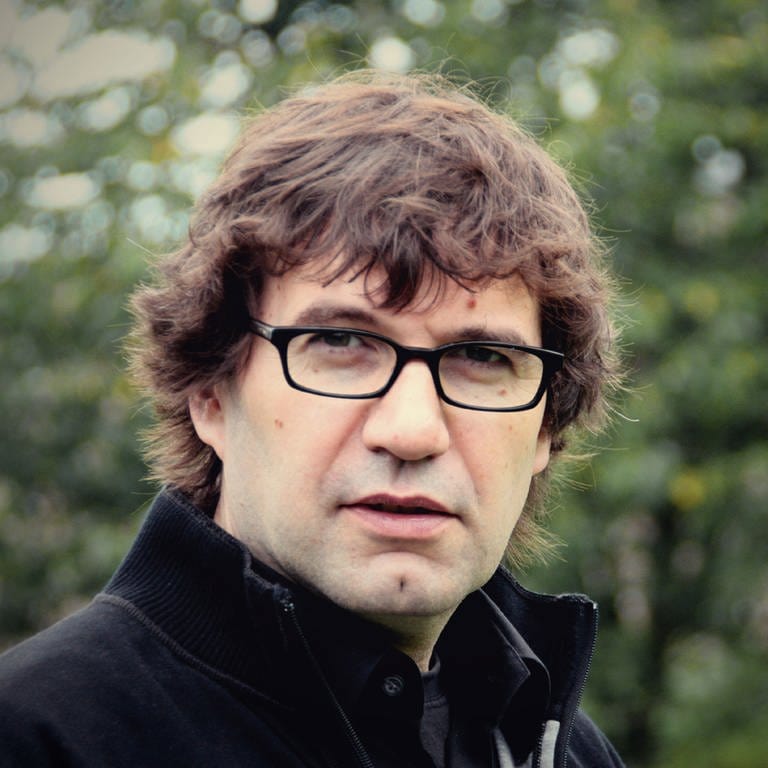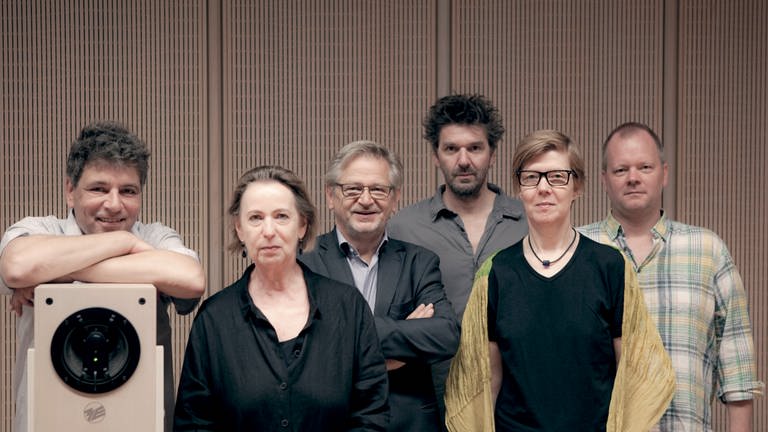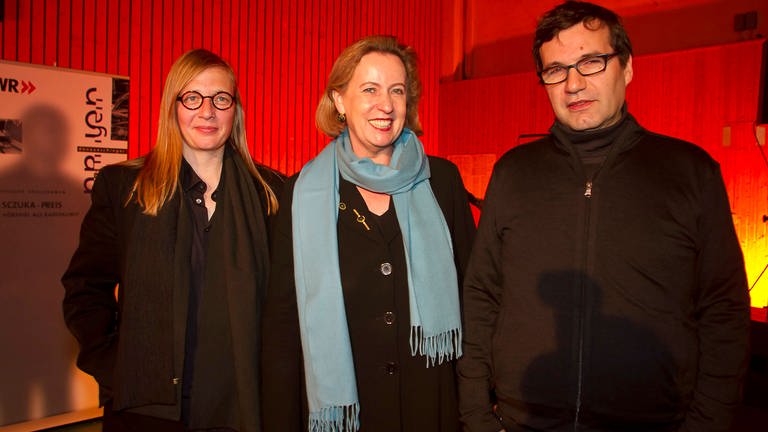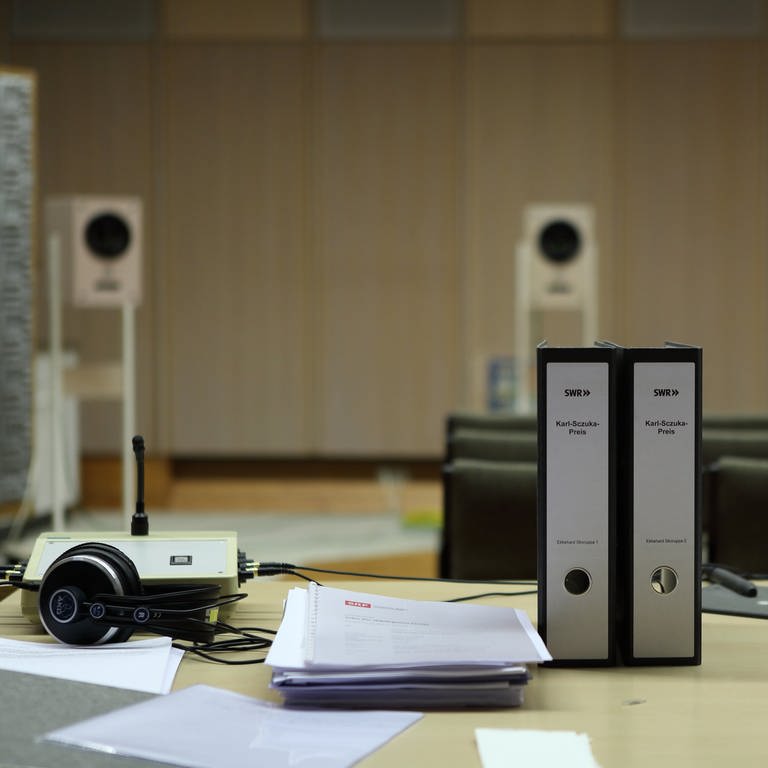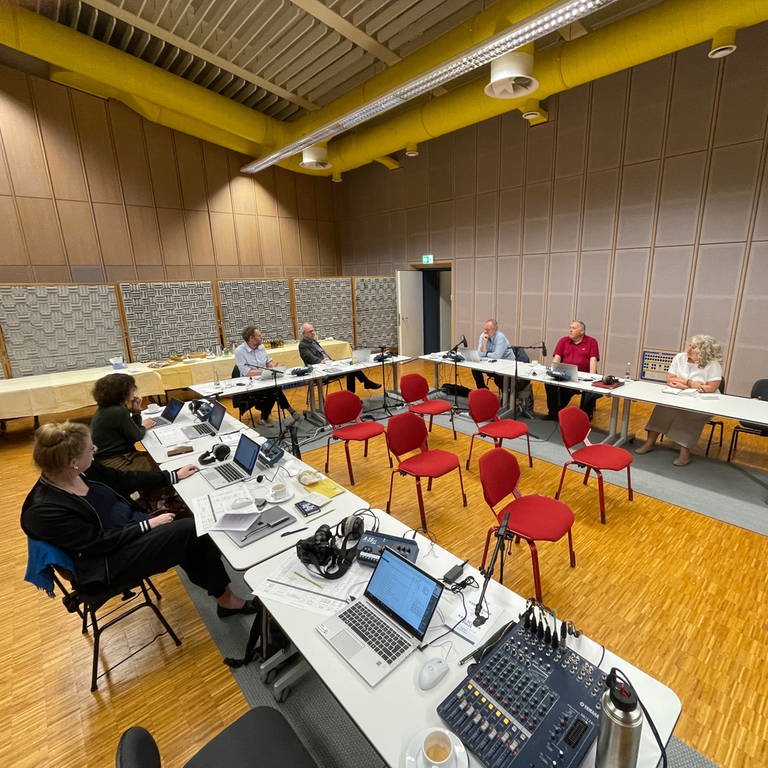The audio piece takes place in itself: as a spacious interlocking of processes word for word: presences without a word's own occurrence, which - not isolated into individual roles - are the same and at the same time: separate, divide, split off part for part, but - hand on word both, uncaused and unnegotiated - become unsyllabic in themselves, so to speak, and lose themselves in the openness.
A series of conceptions, unconnected, i.e.: uninterrupted, which one should consequently bring over both ears in succession, when finally a self-ordering hinge is found, an atactical, almost extraordinary principle, around which the word-phrases, like sentence-words, alternately (impenetrably) tunnel around and around each other: but not so much to obey the inner metric of the amorphous, as to interrogate their implicit forms into monosyllables (i.e. to formulate bindingly by ear: their ligatures from word to word).
Two voices intertwine within a text, seemingly dissected and reassembled in an almost arbitrary manner; yet in reality, they permeate each other: beginnings and ends alternating (intermittent), so that at every moment, words intersect and tunnel through one another, dissolving into abstraction (and swaying) effortlessly, until both speech roles will have spoken the entire text in its entirety.
The piece itself resembles more an aggregate of interjections and states of being than the directive threads of a strict narrative. The score for the text is designed in such a way that individual parts can be disregarded or only "herds" of speech are indicated, allowing both roles to be assigned rigidly or alternatively spoken by several, depending on the possibilities. A role may also be split among one or more speakers, fragmented, or shared by multiple speakers in a constant partition, creating a split or mosaic effect.
Whether monologue or dialogue, choir or recitative - one may and will parcel out the sentences into parts - individual syllables or entire phrases - then rearrange them anew, arranging the pieces in different sequences, repetition, and variation. I specify: this constant incompleteness plays in the interplay between word and word, everywhere, where one open word follows another, this Iliad of syllables: a word-sentence of sentence-words narrates no action, but performs it, words that then (intrinsically focused) converge into a silence, which denies itself (yet persists) and remains — somehow internalized — and silenced.
Radio play by Oswald Egger
Director: Iris Drögekamp
Production: SWR
Premiere broadcast: 21.05.2010
Competition 2010 and jury's statement
On Friday, July 23, 2010, in Baden-Baden, an independent jury chaired by the publicist and former Minister of State for Culture, Christina Weiss, decided on the awarding of prizes.
In 2010, 65 competition entries were submitted from seven countries. The award ceremony took place on October 16 as a public event during the Donaueschinger Musiktage 2010.
"The audio piece 'Ohne Ort und Jahr' by the poet Oswald Egger disrupts the temporal linearity of language sequence through opposing textual traces and sentence islands. Director Iris Drögekamp composes from this a five-voice poetic space, in which imaginative processes ignite 'word for word': From burgeoning vocabularies arises suggestive linguistic events of great sensuality. Oswald Egger and Iris Drögekamp have achieved a delightful audio work with 'Ohne Ort und Jahr'."
About the authors
Iris Drögekamp, born in 1967 in Hagen, Westphalia, studied at Albert-Ludwigs University Freiburg and University of Hamburg, where she completed her studies in 1999 with a thesis on Transboundary Audio Drama Culture. She worked as an editorial assistant and assistant director until 2001 at various radio stations including DLR Berlin, HR, NDR, RB, SR, SWR, and WDR. Additionally, she was a freelance author for taz Hamburg and worked with the Freie Sender Kombinat (FSK) Hamburg. She underwent training as a radio play director at SWR from 2001 to 2002 and has been working as a freelance director and dramaturge in Baden-Baden since 2002. Since 2007, she has also been teaching radio play at HFG Karlsruhe, as well as conducting workshops at Hochschule Darmstadt and HDM Stuttgart. Her productions have received multiple awards.
Oswald Egger, born in 1963 in Lana, South Tyrol, lived in Vienna, where he completed his university studies in 1992 with a Poetics of the Hermetic ("Word for Word"). From 1986 to 1995, he organized the Kulturtage Lana, was editor of the magazine "Der Prokurist" and the "edition per procura" from 1989 to 1998, and has been editor of "Das böhmische Dorf" since 2003. He received an Austrian State Scholarship for Literature in 1995 and 2001, a residency scholarship from the Akademie Schloss Solitude, Stuttgart, in 1996, a residency scholarship at Schloss Wiepersdorf in 1999, and was a writer in residence at the Chinati Foundation in Texas in 2000 and the Villa Aurora in Los Angeles in 2001. Since 2002, he has lived and written at the Hombroich Rocket Station, where he also received a Literature Fellowship. In 2003, he was a visiting professor of poetics at Cornell University, Ithaca. From 2005 to 2007, he received the Elias Canetti Scholarship. Egger writes poetry and essays and has collaborated with composers since 1998, including Burkhard Stangl, Michael Pisaro, Antoine Beuger (with whom he premiered "Word for Word [Geraum]" at the Donaueschinger Musiktage in 2003), and Mark Polscher.
His literary works, translated into French, English, Hungarian, Swedish, and Arabic, have been published in several books, including "Die Erde der Rede" (1993), "Blaubarts Treue" (1997), "Und: der Venus trabant" (1997), "Juli, September, August" (1997), "Sommern" (1998), "Herde der Rede" (1999), "Poemandern Schlaf" (1999), "To Observe The Observe" (2000), "Nichts, das ist" (2001), "-broich" (2003), "Room of Rumor" (2003), "Prosa, Proserpina, Prosa" (2004), "Tag und Nacht sind zwei Jahre" (2006), "nihilum album" (2007), "Diskrete Stetigkeit. Poesie und Mathematik" (2008), and "Die ganze Zeit" (2010).
